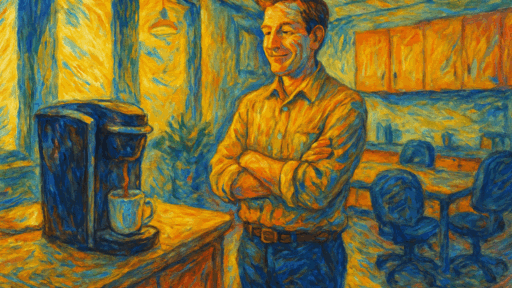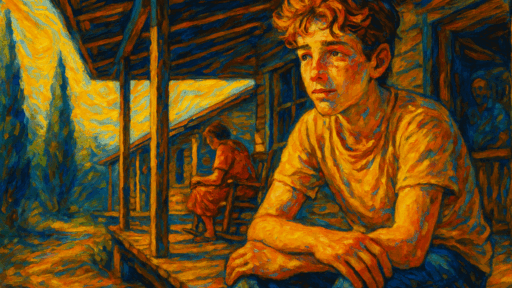“The waiting is the hardest part.”
Tom Petty
At some point during every pregnancy conversation, someone will lean in and ask the question like it’s a moral test.
“So… you’re not finding out?”
And when you say no, you get the look.
It’s the same look people give when you tell them you don’t refrigerate ketchup or still print your boarding passes—a mix of curiosity and faint suspicion, as if you’ve just admitted to churning your own butter.
They’ll say things like, “Oh, I could never do that. I’m way too impatient.”
Which, I’ve come to realize, is just another way of saying, I’m normal, and you’re a lunatic.
We got that reaction a lot. Especially the first time.
Shelley and I were surrounded by friends announcing their gender-reveal parties—fireworks, balloons, the occasional backyard explosion that made national news. Meanwhile, we were the weirdos saying, “We’re waiting for the big day.”
Not the baby’s due date—the moment of truth. The one true surprise left in adult life that doesn’t involve car trouble or your cholesterol.
And that’s really where it started for us—this tiny rebellion against the age of knowing everything.
We already had the apps, the charts, the heartbeat monitor that looked like a gadget from NASA. We could track sleep, kicks, and whatever else you can quantify about a person who doesn’t yet have fingerprints.
But one day, during an early ultrasound, the nurse glanced up from the monitor and asked, “Do you want to know?”
Shelley smiled and shook her head before I could answer.
The nurse nodded, like she understood. Then the room went quiet except for the hum of the machine and that steady flicker on the screen—proof of a secret we were still willing to keep.
It wasn’t one big dramatic decision—it was more like a recurring act of restraint. Every ultrasound was a high-stakes game of “Don’t Ruin the Surprise.”
We’d barely get settled in the room before Shelley would say, “We don’t want to know,” like a nervous tic. Sometimes she’d say it twice, just in case the technician was new or had a mischievous streak.
You could see the tech’s whole body language change. They’d squint at the screen, tilt the wand like they were diffusing a bomb, and announce things in vague, noncommittal terms.
“Everything looks good… right there.”
“Right where?”
“Just… there. In the baby region.”
Meanwhile, I’d be watching the monitor like I was decoding a satellite feed, trying not to accidentally see something I couldn’t unsee.
You start convincing yourself you know what you’re looking at—like one of those magic-eye posters that never quite comes into focus.
“That’s definitely a leg.”
“That’s an arm.”
“That… might be a sandwich?”
By the third appointment, it became almost comical.
We’d walk in, and the nurse would say, “You’re the couple that doesn’t want to know, right?”
And I’d think, Yes, that’s us. The last two romantics in the suburbs.
The guessing became its own sport.
Everyone around us had theories—belly shape, cravings, dreams, astrology. My mom swore she could tell by the way Shelley carried the baby.
“She’s all out front,” she said knowingly. “That means boy.”
I asked her what it meant that I’d gained fifteen sympathy pounds in the same area.
She didn’t laugh.
Every visit, every conversation, the anticipation grew—not in a dramatic movie-montage way, but in the quiet, daily buildup of suspense that somehow makes life feel a little more cinematic.
By the time the big day came, even I was starting to crack.
Nine months of not knowing builds a strange kind of tension—not panic exactly, just this low hum of curiosity that sneaks into everything.
You find yourself imagining two completely different futures every time you pass a car seat display at Target.
And then, suddenly, it’s time.
No slow buildup, no orchestral cue—just the unmistakable chaos of a hospital room where everyone seems to know what they’re doing except you.
Labor is a blur. It’s pain and breathing and timing and nurses moving like a pit crew. There’s the doctor, focused. There’s me, doing my best impression of “helpful husband,” which mostly involves staying upright and saying, “You’re doing great” in a voice that sounds like I’m trying to convince myself.
And then—just like that—it happens.
The nurse says, “Here we go,” and there’s this tiny cry that cuts through everything. Time doesn’t slow down, exactly, but it widens—just enough to fit a moment that’s too big to name.
Someone says, “It’s a boy,” and for half a second, I swear the world goes still.
You think you’re ready for it. You think you’ve pictured it enough times that it’ll just be confirmation.
But when it’s real, when that mystery finally unfolds, it hits you somewhere deeper than words.
It’s like finding out the ending of the best story you’ve ever been part of—and realizing you wouldn’t have wanted to skip a single page.
I remember looking at Shelley—exhausted, radiant, laughing and crying at the same time—and thinking, we did it. We actually waited.
Not because we’re patient people, but because we wanted that exact second—that one pure, unrepeatable surprise.
Later, I walked into the waiting room to a small crowd of family and friends who had been guessing for months.
No gender reveal balloons. No smoke cannons. Just me, standing there with a grin I couldn’t contain.
“It’s a boy,” I said, and the whole room cheered like we’d just won something bigger than we understood.
I get why people want to know.
Life is unpredictable enough. If you can control one variable, why not? Paint the nursery. Monogram the blanket. Get a head start on ordering a tiny football helmet or ballet slippers.
But here’s the thing: there aren’t many real surprises left. Most of them, if we’re honest, aren’t the good kind.
You don’t usually get a phone call that starts with, “You’ll never believe this, it’s amazing!”
Waiting for that moment—that one, small, beautiful mystery to unfold on its own—it taught me something I didn’t know I needed to learn: patience can actually heighten joy… if you’ll forgive the phrasing.
Because it’s not just about the baby. It’s about the waiting.
The wondering. The little daydreams you build together when you don’t know.
Every time someone asked, “What do you think it is?” we got to imagine both possibilities. Both futures. For nine months, our kid got to be every story at once.
And then, when that moment finally came—when the guessing stopped and the truth arrived with a cry and a heartbeat—it felt like we’d unwrapped something bigger than an answer.
I’m not saying everyone should do it. You’re not a bad person if you want to know.
But if you can hold off—even just once—it’s worth it.
Because there’s a difference between information and revelation.
One is knowing ahead of time.
The other is living through it.
And if you’re lucky, someday you’ll get to walk into a waiting room, your heart pounding, your smile too big, and tell everyone you love a secret they’ve been waiting to hear.
You’ll get to watch joy spread through the room like light.
And you’ll think, Yeah. This was worth waiting for.






